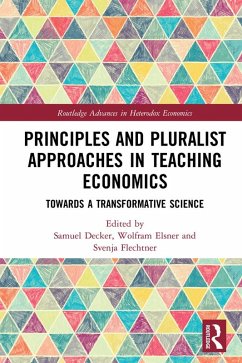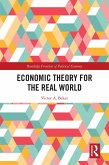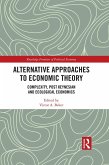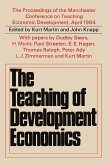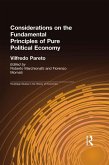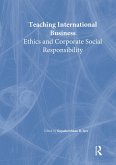Principles and Pluralist Approaches in Teaching Economics (eBook, ePUB)
Towards a Transformative Science
Redaktion: Decker, Samuel; Flechtner, Svenja; Elsner, Wolfram
44,95 €
44,95 €
inkl. MwSt.
Sofort per Download lieferbar

22 °P sammeln
44,95 €
Als Download kaufen

44,95 €
inkl. MwSt.
Sofort per Download lieferbar

22 °P sammeln
Jetzt verschenken
Alle Infos zum eBook verschenken
44,95 €
inkl. MwSt.
Sofort per Download lieferbar
Alle Infos zum eBook verschenken

22 °P sammeln
Principles and Pluralist Approaches in Teaching Economics (eBook, ePUB)
Towards a Transformative Science
Redaktion: Decker, Samuel; Flechtner, Svenja; Elsner, Wolfram
- Format: ePub
- Merkliste
- Auf die Merkliste
- Bewerten Bewerten
- Teilen
- Produkt teilen
- Produkterinnerung
- Produkterinnerung

Bitte loggen Sie sich zunächst in Ihr Kundenkonto ein oder registrieren Sie sich bei
bücher.de, um das eBook-Abo tolino select nutzen zu können.
Hier können Sie sich einloggen
Hier können Sie sich einloggen
Sie sind bereits eingeloggt. Klicken Sie auf 2. tolino select Abo, um fortzufahren.

Bitte loggen Sie sich zunächst in Ihr Kundenkonto ein oder registrieren Sie sich bei bücher.de, um das eBook-Abo tolino select nutzen zu können.
This volume is a state-of-the-art compilation of diverse and innovative perspectives, principles, and a number of practiced approaches of fields, courses, and methods of pluralist economics teaching. It fosters constructive controversy aiming to incite authors and commentators to engage in fruitful debate.
- Geräte: eReader
- ohne Kopierschutz
- eBook Hilfe
- Größe: 5.31MB
Andere Kunden interessierten sich auch für
![Economic Theory for the Real World (eBook, ePUB) Economic Theory for the Real World (eBook, ePUB)]() Victor A. BekerEconomic Theory for the Real World (eBook, ePUB)42,95 €
Victor A. BekerEconomic Theory for the Real World (eBook, ePUB)42,95 €![Advancing Pluralism in Teaching Economics (eBook, ePUB) Advancing Pluralism in Teaching Economics (eBook, ePUB)]() Advancing Pluralism in Teaching Economics (eBook, ePUB)42,95 €
Advancing Pluralism in Teaching Economics (eBook, ePUB)42,95 €![Alternative Approaches to Economic Theory (eBook, ePUB) Alternative Approaches to Economic Theory (eBook, ePUB)]() Alternative Approaches to Economic Theory (eBook, ePUB)44,95 €
Alternative Approaches to Economic Theory (eBook, ePUB)44,95 €![Teaching of Development Economics (eBook, ePUB) Teaching of Development Economics (eBook, ePUB)]() Teaching of Development Economics (eBook, ePUB)35,95 €
Teaching of Development Economics (eBook, ePUB)35,95 €![Considerations on the Fundamental Principles of Pure Political Economy (eBook, ePUB) Considerations on the Fundamental Principles of Pure Political Economy (eBook, ePUB)]() Vilfredo ParetoConsiderations on the Fundamental Principles of Pure Political Economy (eBook, ePUB)56,95 €
Vilfredo ParetoConsiderations on the Fundamental Principles of Pure Political Economy (eBook, ePUB)56,95 €![Teaching International Business (eBook, ePUB) Teaching International Business (eBook, ePUB)]() Erdener KaynakTeaching International Business (eBook, ePUB)35,95 €
Erdener KaynakTeaching International Business (eBook, ePUB)35,95 €![Teaching and Program Variations in International Business (eBook, ePUB) Teaching and Program Variations in International Business (eBook, ePUB)]() Erdener KaynakTeaching and Program Variations in International Business (eBook, ePUB)35,95 €
Erdener KaynakTeaching and Program Variations in International Business (eBook, ePUB)35,95 €-
-
-
This volume is a state-of-the-art compilation of diverse and innovative perspectives, principles, and a number of practiced approaches of fields, courses, and methods of pluralist economics teaching. It fosters constructive controversy aiming to incite authors and commentators to engage in fruitful debate.
Dieser Download kann aus rechtlichen Gründen nur mit Rechnungsadresse in A, B, BG, CY, CZ, D, DK, EW, E, FIN, F, GR, HR, H, IRL, I, LT, L, LR, M, NL, PL, P, R, S, SLO, SK ausgeliefert werden.
Produktdetails
- Produktdetails
- Verlag: Taylor & Francis
- Seitenzahl: 362
- Erscheinungstermin: 28. Juni 2019
- Englisch
- ISBN-13: 9781351711272
- Artikelnr.: 58397902
- Verlag: Taylor & Francis
- Seitenzahl: 362
- Erscheinungstermin: 28. Juni 2019
- Englisch
- ISBN-13: 9781351711272
- Artikelnr.: 58397902
- Herstellerkennzeichnung Die Herstellerinformationen sind derzeit nicht verfügbar.
Samuel Decker is an economist and activist based in Berlin, Germany. He works as a scientific assistant for the online learning platform Exploring Economics (www. exploring-economics.org/en/). He holds a master's degree in Political Economy of European Integration and is an active member of the student movement for pluralism in economics. Wolfram Elsner was Professor of Economics at the University of Bremen, Germany, from 1995 until he retired in 2016. He has also worked as head of local economic development, head of the Planning Division of the Ministry of Economic Affairs of the State of Bremen, and as director of the State of Bremen government's economic research institute from 1986 to 1995. He was president of the European Association for Evolutionary Political Economy from 2012 to 2016. Svenja Flechtner is an Assistant Professor of Pluralist Economics at the University of Siegen, Germany. She has been a research assistant at Europa-Universität Flensburg and Freie Universität Berlin. From 2014 to 2018, she was a council member of the European Association for Evolutionary Political Economy.
Towards a pluralist economic education for a transformative science -
Introduction. Part 1: Principles of Teaching Pluralist Economics. 1. The
Second Opinion: An Ethical Approach to Learning and Teaching Economics. 2.
Making the incommensurable comparable: A comparative approach to pluralist
economics education. 3. What can teaching critical pluralist economics gain
from "de-othering" sociology?. 4. Comparing paradigms on a level playing
field. 5. It Needs Two Eyes to See in Perspective: Teaching Economics
through the Confrontation of Dissenting Views. 6. Economic competence,
economic understanding, and reflexive judgment: A social theory of teaching
teachers of economics. Part 2: Approaches and Building Blocks. 7.
Introduction to Critical Political Economy in a multi-paradigmatic setting.
8. Heterodox perspectives in teaching the European integration and crisis:
Critical political economy and post-Keynesianism. 9. Ecological economics
in research and teaching: A matter of theoretical and ideological
perspective. 10. Suggestions for incorporating sustainability into the
macroeconomics course. 11. Demand-driven ecological collapse. A stock-flow
fund-service model of money, energy and ecological scale. 12. Teaching
feminist economics through student-written diaries. 13. Undermining the
microeconomic textbook approach: Steps towards competitive pluralism. 14.
Functional income distribution in economic paradigms: The failure of the
neoclassical approach and alternatives. 15. The balance-sheet approach to
macroeconomics. 16. How to teach Ethics & Economics to undergraduate
students?. 17. Addressing controversies in economics instruction through
interdisciplinary learning communities: The Evergreen experience. Part 3:
Teaching for Socio-Ecological Transformation: Economics as a Transformative
Science?. 18. Contours of a critical transformative science. 19.
Transformative Economics - Calling for a more conscious relationship
between economics and society. 20. Tackling the roots: (Economic) Education
for social-ecological transformation and degrowth societies. 21. Pluralist
economics is taking shape. But further steps have to follow - Conclusion.
Appendix: Documentation: PEP-Promoting Economic Pluralism. A basic text of
The Foundation for Promoting Reform towards pluralist Economics for the
Public Interest (PREP)
Introduction. Part 1: Principles of Teaching Pluralist Economics. 1. The
Second Opinion: An Ethical Approach to Learning and Teaching Economics. 2.
Making the incommensurable comparable: A comparative approach to pluralist
economics education. 3. What can teaching critical pluralist economics gain
from "de-othering" sociology?. 4. Comparing paradigms on a level playing
field. 5. It Needs Two Eyes to See in Perspective: Teaching Economics
through the Confrontation of Dissenting Views. 6. Economic competence,
economic understanding, and reflexive judgment: A social theory of teaching
teachers of economics. Part 2: Approaches and Building Blocks. 7.
Introduction to Critical Political Economy in a multi-paradigmatic setting.
8. Heterodox perspectives in teaching the European integration and crisis:
Critical political economy and post-Keynesianism. 9. Ecological economics
in research and teaching: A matter of theoretical and ideological
perspective. 10. Suggestions for incorporating sustainability into the
macroeconomics course. 11. Demand-driven ecological collapse. A stock-flow
fund-service model of money, energy and ecological scale. 12. Teaching
feminist economics through student-written diaries. 13. Undermining the
microeconomic textbook approach: Steps towards competitive pluralism. 14.
Functional income distribution in economic paradigms: The failure of the
neoclassical approach and alternatives. 15. The balance-sheet approach to
macroeconomics. 16. How to teach Ethics & Economics to undergraduate
students?. 17. Addressing controversies in economics instruction through
interdisciplinary learning communities: The Evergreen experience. Part 3:
Teaching for Socio-Ecological Transformation: Economics as a Transformative
Science?. 18. Contours of a critical transformative science. 19.
Transformative Economics - Calling for a more conscious relationship
between economics and society. 20. Tackling the roots: (Economic) Education
for social-ecological transformation and degrowth societies. 21. Pluralist
economics is taking shape. But further steps have to follow - Conclusion.
Appendix: Documentation: PEP-Promoting Economic Pluralism. A basic text of
The Foundation for Promoting Reform towards pluralist Economics for the
Public Interest (PREP)
Towards a pluralist economic education for a transformative science -
Introduction. Part 1: Principles of Teaching Pluralist Economics. 1. The
Second Opinion: An Ethical Approach to Learning and Teaching Economics. 2.
Making the incommensurable comparable: A comparative approach to pluralist
economics education. 3. What can teaching critical pluralist economics gain
from "de-othering" sociology?. 4. Comparing paradigms on a level playing
field. 5. It Needs Two Eyes to See in Perspective: Teaching Economics
through the Confrontation of Dissenting Views. 6. Economic competence,
economic understanding, and reflexive judgment: A social theory of teaching
teachers of economics. Part 2: Approaches and Building Blocks. 7.
Introduction to Critical Political Economy in a multi-paradigmatic setting.
8. Heterodox perspectives in teaching the European integration and crisis:
Critical political economy and post-Keynesianism. 9. Ecological economics
in research and teaching: A matter of theoretical and ideological
perspective. 10. Suggestions for incorporating sustainability into the
macroeconomics course. 11. Demand-driven ecological collapse. A stock-flow
fund-service model of money, energy and ecological scale. 12. Teaching
feminist economics through student-written diaries. 13. Undermining the
microeconomic textbook approach: Steps towards competitive pluralism. 14.
Functional income distribution in economic paradigms: The failure of the
neoclassical approach and alternatives. 15. The balance-sheet approach to
macroeconomics. 16. How to teach Ethics & Economics to undergraduate
students?. 17. Addressing controversies in economics instruction through
interdisciplinary learning communities: The Evergreen experience. Part 3:
Teaching for Socio-Ecological Transformation: Economics as a Transformative
Science?. 18. Contours of a critical transformative science. 19.
Transformative Economics - Calling for a more conscious relationship
between economics and society. 20. Tackling the roots: (Economic) Education
for social-ecological transformation and degrowth societies. 21. Pluralist
economics is taking shape. But further steps have to follow - Conclusion.
Appendix: Documentation: PEP-Promoting Economic Pluralism. A basic text of
The Foundation for Promoting Reform towards pluralist Economics for the
Public Interest (PREP)
Introduction. Part 1: Principles of Teaching Pluralist Economics. 1. The
Second Opinion: An Ethical Approach to Learning and Teaching Economics. 2.
Making the incommensurable comparable: A comparative approach to pluralist
economics education. 3. What can teaching critical pluralist economics gain
from "de-othering" sociology?. 4. Comparing paradigms on a level playing
field. 5. It Needs Two Eyes to See in Perspective: Teaching Economics
through the Confrontation of Dissenting Views. 6. Economic competence,
economic understanding, and reflexive judgment: A social theory of teaching
teachers of economics. Part 2: Approaches and Building Blocks. 7.
Introduction to Critical Political Economy in a multi-paradigmatic setting.
8. Heterodox perspectives in teaching the European integration and crisis:
Critical political economy and post-Keynesianism. 9. Ecological economics
in research and teaching: A matter of theoretical and ideological
perspective. 10. Suggestions for incorporating sustainability into the
macroeconomics course. 11. Demand-driven ecological collapse. A stock-flow
fund-service model of money, energy and ecological scale. 12. Teaching
feminist economics through student-written diaries. 13. Undermining the
microeconomic textbook approach: Steps towards competitive pluralism. 14.
Functional income distribution in economic paradigms: The failure of the
neoclassical approach and alternatives. 15. The balance-sheet approach to
macroeconomics. 16. How to teach Ethics & Economics to undergraduate
students?. 17. Addressing controversies in economics instruction through
interdisciplinary learning communities: The Evergreen experience. Part 3:
Teaching for Socio-Ecological Transformation: Economics as a Transformative
Science?. 18. Contours of a critical transformative science. 19.
Transformative Economics - Calling for a more conscious relationship
between economics and society. 20. Tackling the roots: (Economic) Education
for social-ecological transformation and degrowth societies. 21. Pluralist
economics is taking shape. But further steps have to follow - Conclusion.
Appendix: Documentation: PEP-Promoting Economic Pluralism. A basic text of
The Foundation for Promoting Reform towards pluralist Economics for the
Public Interest (PREP)
